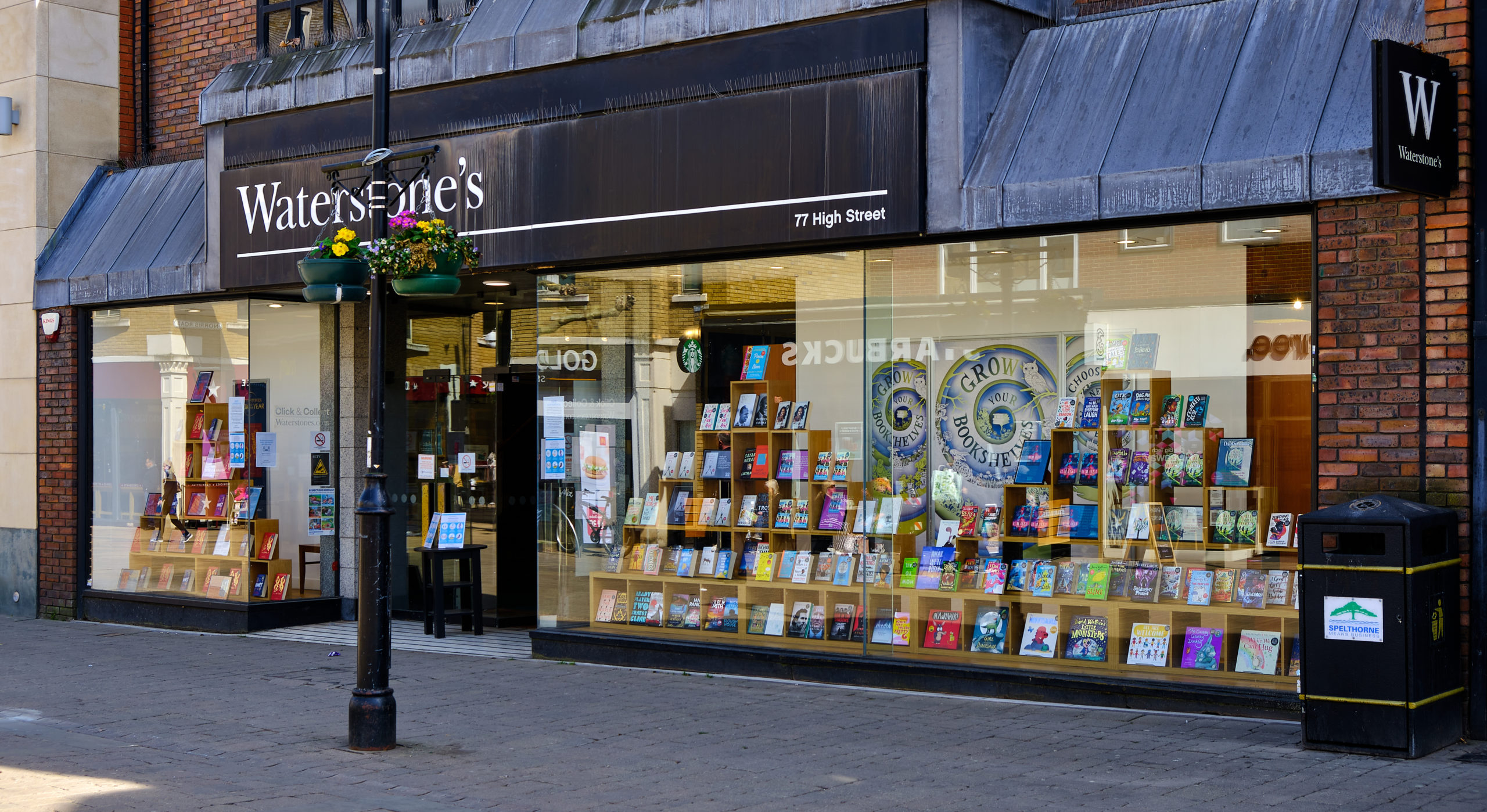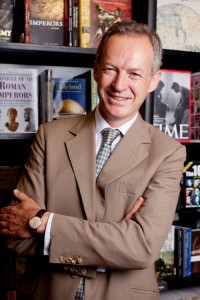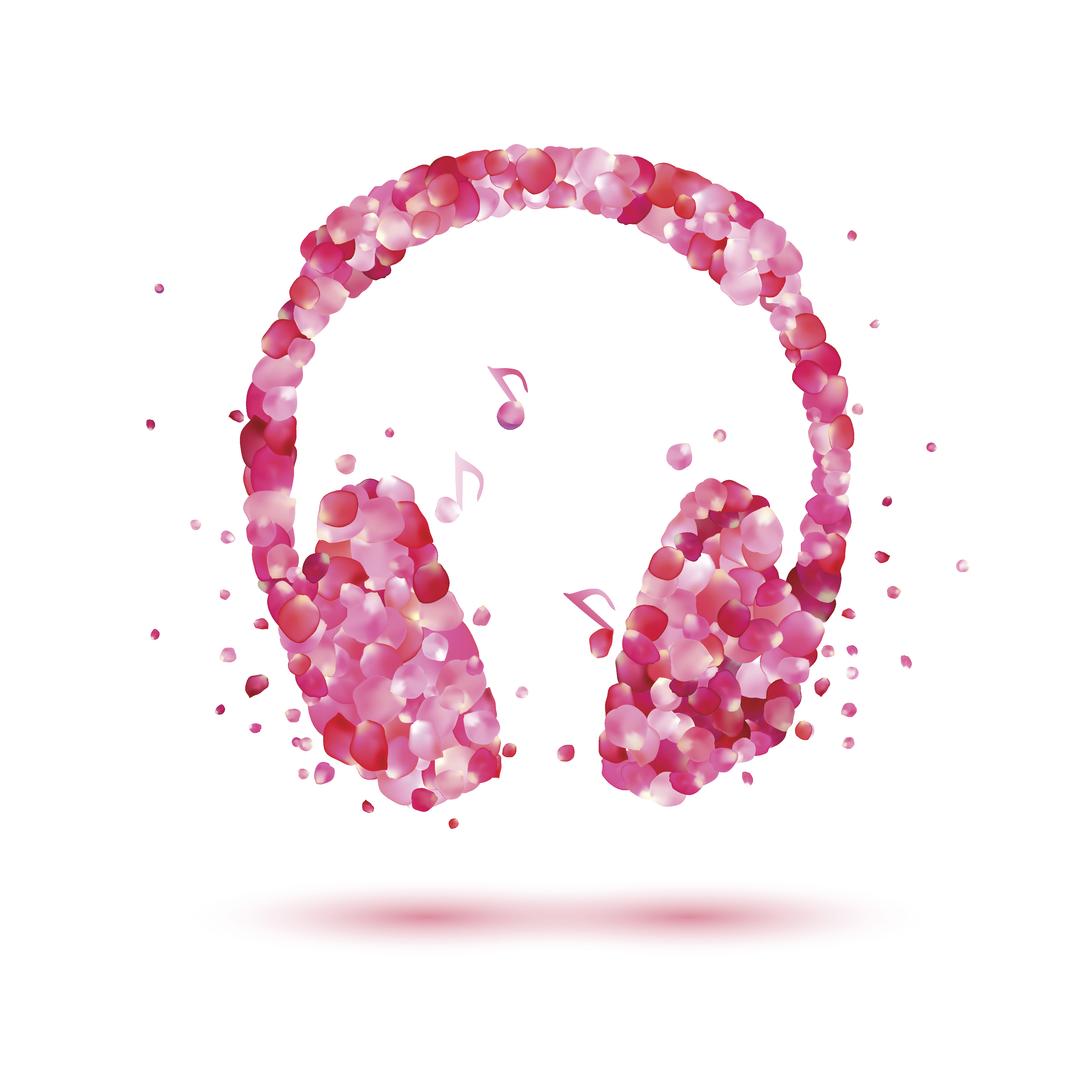
These days, there’s a true distinction between what is now known as “traditional media” and “digital media.”
When I was in school, media was media. But the advent of digital created what’s known as a retronym. That’s when a modifier has to be created so that we’re clear about what we’re talking about. Guitars used to be. . . guitars. Until the electric guitar came around, creating the need for “acoustic” guitars.
It’s the same with media and radio. Digital media forced us to use the term “traditional” (or “old school”) media so that we don’t confuse it with digital.
Satellite radio and streaming radio led to us using the term “broadcast” or “terrestrial” radio to describe AM and FM stations. (Radioplayer’s Mike Hill prefers “proper radio,” and he’ll get no argument from me.)
“Traditional media,” then, has become the catchall for radio, TV, and print. And let’s not forget books – perhaps the oldest “old school” medium of them all. There’s nothing more musty than “physical books” (another retronym).
But at least books can be easily purchased electronically from e-commerce sites like the gargantuan Amazon. That’s where many first started purchasing books because of the company’s ability to stock millions of titles, as opposed to lowly bookstores where only a few thousand are typically sold.
Electronic books – made famous by Amazon’s Kindle – helped make it even more daunting for physical bookstores. The ability to browse, check out ratings and review, and even read a free sample chapters or two are all part of the benefits of e-readers. And as they’ve become popular, they’ve made it even more difficult for bookstores to survive.
Then COVID comes along, and the retail world grinds to a halt as we find ourselves cooped up at home. Book sales during the pandemic were actually quite robust. But for bookstores, stay-at-home orders and a fearful public couldn’t have been more devastating.
So, what do you do if you’ve spent your entire career as a bookseller, and then you’re tasked with turning around the fortunes of one of the biggest retail brands, Barnes & Noble?
 That’s precisely the challenge being faced by Britain’s James Daunt. He had his own eponymous stores – Daunt Books – throughout the UK before being tapped to rescue the traditional Waterstones. And when that iconic brand purchased Barnes & Noble, many financial analysts scratched their collective heads.
That’s precisely the challenge being faced by Britain’s James Daunt. He had his own eponymous stores – Daunt Books – throughout the UK before being tapped to rescue the traditional Waterstones. And when that iconic brand purchased Barnes & Noble, many financial analysts scratched their collective heads.
You think broadcast radio’s under some pressure? Barnes & Noble is being chased down by Amazon, the biggest, baddest competitor in the space. If you’ll excuse the expression, there’s no more daunting force in the book world than going up against the company that invented the online bookstore, and then e-books and e-readers.
James Daunt is clear-eyed about who and what he’s up against. In an aptly titled feature story in the Financial Times – “The Englishman trying to save American bookstores from Amazon” – John Gapper describes Daunt’s suicide mission in great detail.
At one point, the ever-rebellious Daunt describes his competition in the cold, harsh light of day:
“Amazon is the predator that has culled the weak in this business and left only the strongest. If we relax for a second, it will eat us.”
And that brings us to the core of today’s post: Can American radio operators learn anything from Daunt’s battle with what Evan Shapiro refers to as one of the Trillion Dollar Death Stars – Amazon?
I’m going to list some of Daunt’s key philosophical points along with the unconventional competitive actions he has taken – NOT because I’m suggesting radio do all these things. Instead, I’m pointing them out for the purpose of having a strategic conversation.
You may find as you read along that what seem like smart and logical tactics for a bookstore chain going up against a global e-commerce giant seem very radical when you consider them for radio.
when you consider them for radio.
Or maybe not.
Check out these big moves James Daunt has adopted to strategically position his physical, local bookstores against the digitally seamless and ginormous Amazon:
1. Curation and warmth are key elements. The FT Magazine’s Gapper observes that Daunt’s formula can be summed up this way:
“Bookshops work best if they feel like clubs in which dedicated readers can consult expert curators.”
In radio, the equivalent would be to focus hiring priorities on bringing in music junkies (or news/talk/sports commentators) who are stone cold experts in their fields. It is about creating a relationship with the customer (listener) with talent that truly understands the material and their target market.
Moreover, Daunt gives his literary curators the freedom to “break format,” while making deep, loyal connections with patrons:
 “I’m not prepared to tolerate bad bookshops because I know what a good one is. If you give intelligent booksellers freedom, they will create (good ones). It may take time, but it will happen.”
“I’m not prepared to tolerate bad bookshops because I know what a good one is. If you give intelligent booksellers freedom, they will create (good ones). It may take time, but it will happen.”
So, strong, knowledgeable tuned-in creatives, and the time horizon to build a following and a great local brand. That’s how Daunt would likely approach taking over a radio company.
2. Daunt believes his bookstores can’t be as machine-like, precise, and flawless as Amazon. So why try? His formula is a simple one, but it goes against the grain of how you compete against a juggernaut like Amazon.
In the past, both Barnes & Noble and Waterstones tried to compete mano a mano with Amazon – offering heavy promotions, three-for-two deals, shifting stock around quickly, and other standard tactics. As Gapper observes, “None of it worked.”
In fact, Daunt notes that most of the industry’s booksellers took a similar approach. As he told FT Magazine: “They all operate the same way and they’re all terrible.”
 In radio jargon, that means moving away from the homogenous approach the industry has pursued for decades. Stamped out, manufactured radio stations with the same name in multiple markets featuring the same talent in location after location would not qualify as James Daunt radio.
In radio jargon, that means moving away from the homogenous approach the industry has pursued for decades. Stamped out, manufactured radio stations with the same name in multiple markets featuring the same talent in location after location would not qualify as James Daunt radio.
He believes each of his shops should have their own character, based on their location and their clientele. Some will simply be more profitable than others, but each would cater to a highly localized crowd and neighborhood.
In his mind, Daunt rationalized that “businesses cannot be managed at scale in the same way as when small.”
In order to do so requires extensive (and expensive) management teams and staff supervisors which Daunt has no taste for. His approach: “The magic came from giving staff more autonomy.” In other words, pay great talent and let them do what they do best.
The translation to radio means less top-down control from corporate, and more freedom to make local decisions, not just with strategy and tactics, but even the books stocked and displayed – or in radio’s case, the music that’s played and how it’s presented.
Daunt concludes: “If somebody in Illinois told me how to run this shop (on High Street in London), I would be pretty pissed off. So I’m not going to do it the other way around.”
3. Daunt hires staffers with a passion for the product. In this case, connecting books with people who will appreciate and enjoy them. And so he adjusted his hiring goals to find passion players:
“This is a place for people who love books. Look in the mirror and ask if you really want to engage. If you don’t and it’s just a retail job, go and get one at Boots or Target. Just leave.’”
Harsh? Perhaps. But definitive about finding people who truly embrace what they’re doing. I recall when WMMO in Orlando signed on back in the ’90s, one of the statements in their credo was this:
 “We love the music as much as you do.”
“We love the music as much as you do.”
DJs like Jim Ladd exuded that same sense of communal enjoyment of rock n’ roll decades ago on L.A. radio:
“I’m Jim Ladd, and we’re listening to KMET” was the tenor and tone of his audience embrace and inclusion. Daunt and Ladd would have enjoyed working together.
4. The element of “oh wow” is a key to Daunt’s scheme. As Gapper notes, there’s a fear among book publishers – the equivalent of record labels – that bookstores must survive. The analogy is that while music is now sold and marketed through many digital channels and marketplaces, radio’s survival is still the key cog in exposure, adoption, branding, and sales.
As publisher Sharmaine Lovegrove explained to Gapper, “Readers need to be surprised, to be expressed to. They can’t get that from an algorithm.”
 And that same element of joy when a radio host plays something you haven’t heard in a while – as opposed to the so-called “safe list” – goes to the heart of James Daunt’s unformulaic formula for saving his bookstores.
And that same element of joy when a radio host plays something you haven’t heard in a while – as opposed to the so-called “safe list” – goes to the heart of James Daunt’s unformulaic formula for saving his bookstores.
Make no mistake about it. He is a pragmatic, and hard-nosed businessman. Daunt has come under fire for paying people lower wages, while cleaning house in order to make his bottom line work. But his investment is in strong, passionate pros and letting them do what they do best.
What do you think of his tactics?
Is there an avenue for select radio stations or even radio companies to take this Don Quixote-like approach?
Does Daunt’s brand of counter-programming offer up any ideas about how radio broadcasters could better compete with its Amazons – Spotify, Pandora, SiriusXM, to name a few?
Or is he an old school dinosaur making a futile last stand to fend off Amazon’s world domination?
That story might make a great book.
- What Is It With Female Robot DJs? - April 30, 2025
- Why “Dance With Those Who Brung You” Should Be Radio’s Operating Philosophy In 2025 - April 29, 2025
- The Exponential Value of Nurturing Radio Superfans - April 28, 2025




I think that radio has forgotten what it is actually selling. Listeners are drawn in by music, but I think the actual product is companionship. There is a reason why some names are recognizable outside the field, because they have connected with their audience.
If the product you are selling is music, you have a lot of competition for the exact same product. But, if you are selling your talent, then you have a (hopefully) unique product in your market.
I agree with the ‘hire passionate people and let them do their job’ approach. After all, if you’re not excited about your job, why should anyone else be?
Appreciate the comment, Paul. Sometimes, it is that basic.
I agree with one exception. The product is music or news or whatever your programming is. People come for the product, but they come back because they love your brand. Companionship, expert curation, the ability to connect authentically, discovery of the new, those are all brand attributes and not part of the product. Nike sells sneakers and Apple sells start phones, but those are not their brands. You have to define your brand based on how people feel about themselves in the presence of your brand.
Abby, you are spot on. You see this play out in markets where the are multiple public radio stations, often duplicating several NPR and other network shows. It’s their brand essence that separates them – the stations that truly reflect their communities and their listeners.
Great line Paul. “The actual product is companionship.”
Love the term “Proper Radio.” My Covid Hibernation Project was recuing the license of the 2nd radio station I worked at: 1220 AM, Hamden CT. It’s been on air as 1220 WATX for less than a month; folks are tuned in and Live Nation is buying spots. Community Radio with Connecticut Gold from a high wire above a dynamite shack at a Goat Yoga Farm. Simple, connected and serving the FCC licensed area. 1220watx.com. A work in progress and the best is yet to come.
Indeed, Clark – that sounds like “proper radio” to me.
James doesn’t have his revenue priced by a rating system that’s woefully flawed and outdated in the digital data world we live in
You’re right, of course. It’s much easier to count books sold and have your success measured by how many are walking out the door. There’s no doubt James would be frustrated by radio’s measurement, as well as how it defines success.
A+ column Dr. Jacobs. I some ways public radio has operated a “club” for many years. AAA and Alt Rock non stations such as The Current, Milwaukee Radio (WYMS) and KEXP are perfecting this model now.
When I saw Daunt use the term clubhouse, I knew there was a strong connection to his activity at Barnes & Noble, and how radio stations can operated when they serve a unique audience – or tribe. Thanks for commenting, Ken.
Daunt is spot on for my corner of the broadcast radio world – a public radio jazz & blues station in Chicago. We stopped playlisting our jazz hosts years ago. Every deejay (yeah we still call them deejays) needs to have a strong personal knowledge of jazz artists, recordings, history and the local scene or they do not get on the air. Every deejay knows the parameters and is on the same team, but they “curate” their own shows and are expected to go deep. Our most important measuring stick is listener donations and they keep rising every year.
Not sure if a commercial rock station could operate successfully this way in 2021, but there are plenty of rockers who care about the music as much as jazz folks and could present the music with the same sort of knowledgeable TLC. It doesn’t seem rock jocks are allowed to display much of their knowledge, they hardly talk about the music at all, but when they do, even a little, like say Bob Stroud on Chicago’s WDRV, the audience loves them for it.
Sure, companionship is important, but there’s a lot of true music lovers in all genres out there that could be better served by a radio model closer to Daunt’s bookstore idea – and for the same reasons.
Dan, you are correct in your assertion that music fans hail from all formats and genres. Connecting with these music communities is what makes radio stations like yours special. And you’re right about Stroud. He totally “gets” the relationship between the audience, the music, and yes, him and The Drive. Thanks for chiming in.
Being a lifelong bookworm & broadcaster, I especially loved this one. And thanks for mentioning Jim Ladd. I had the honor of working with Jim each evening for some 13 years at KLOS; no telling how many times his listeners and I heard his inclusive, reassuring phrase “You and I are listening to KLOS….”
I also heard–and saw–much disrespect and outright anger from upper management (not PDs) and consultants (certainly not you) he received for programming his own music. His storied connection with his audience and the artists he chose to play were far more important than if his numbers were up or down.
Bookstores have fantastic variety through their doors. Do classic rock stations, or other genres? Wider playlists, fewer commercials, real humans you know who are in touch via email/social/appearances, being LOCAL and promoting all that seem crucial to me when going up against satellites & streaming.
And why not partner with bookstores? There are plenty of books released every month–every week in some cases–that stations & bookstores could cross-pollinate, regardless of format. It used to happen at record store chains, so why not bookstores now?
Gary, thanks for this comment, and the Ladd memory. I remember working for KLOS in the last 70s when I did research for ABC’s Owned Stations. I conducted focus groups, and was on the way back to my hotel when I turned on KMET. The respondents had sung Jim’s praises in the groups, and I wanted to hear what he all about. It was so good, I almost drove off the 405.
And I love the book store idea, and even a book club promotion with the morning show in situations where it’s a good fit.
And I had the same reaction as you most every night listening to Jim on the way home, ironically just off the 405 in Westwood!
It was an LA thing.
Your column today should be a “must read” by everyone in radio management. The analogy is spot on and the parallels between book stores and AM/FM radio is particularly precise. Other examples include cruise ships vs. airplanes, horses vs. cars , video rental stores vs. Netflix, taxiʻs vs. uber/lyft and fast food vs. fine dining. The list is deep. In essence, every business throughout history has a cycle and eventually every industry faces new and intense competition. The radio business that we have spent years in will survive; albeit smaller, more niched and more ʻlocalʻ. And once the iHearts of the world exit the business, the smart and passionate broadcasters will re-emerge creating compelling and creative content – and reflect what radio has excelled at since the advent of TV- which is super serving and delivering value to its primary area of influence; the local community.
Thank you, David. Not every station can be intensely local and personality-driven. But two or three in most markets isn’t just feasible, executed well, it could work. Appreciate it.
Mr. Baronfeld’s comment caught my eye – and generated a tear in my eye knowing full well that it will be difficult for most in radio management to pay attention to this “must read”. In many cases they’re tied to increasing the bottom line, cutting expenses and making their big bosses happy. If radio were to follow these guidelines the medium would be much more respected by multitudes and creating a different kind of experience for the listener. I learned early on that you couldn’t BE your competition in order to BEAT them. Broadcast (“proper”) radio has been looking over its shoulder for decades trying to outdo the digital platforms that are knocking on the door, and we hear the end result today. The revenue “quick fix” that faces most large media companies will be the driving force until the 21st century version of Bill Drake or Todd Storz or Buzz Bennet surfaces to reinvent the model. Upper management doesn’t care. Middle management has to bow to upper management. Where DOES this put the all important talent?
Very good points. Sadly, this is yet another in a long line of posts that are telling radio to break the mold, take chances, reinvent, disrupt, etc. Yet – by and large it does not happen. When I do listen to music radio anymore its SiriusXM. Yes, there is a world of variety when it comes to music. But, on many channels it has personalities who truly break the mold. Check out Elizabeth Cook on Outlaw Country. Or many of the personalities on Little Steven’s Underground Garage. There are more. Yes, I know – they are not bound by the constraints of PPM methodology. However, isn’t that the point of this blog episode?
Brand is everything these days! Are you truly catering to your target audience or have you sanitized the product trying to make one size fit all? I like the idea behind his efforts to make individual stores…unique. I’m afraid national radio brands are doing the opposite. Happily, I’m now working for Local Media San Diego which super-serves our community.
Corey, thanks for chiming in & glad it’s going well in SD. Please pass my regards onto the team.
Excelente artículo ! Soy presentador y productor de radio en Argentina y tus textos me han ayudado mucho
Gabriel, gracias por leer mi blog!
Love this!
That’s it, that’s the comment.
You ask if Daunt can succeed. A key issue for bookstores is getting a fair shake from distributors. That’s obviously not an issue for radio broadcasters. Heck, we even get a break on our streaming costs compared to pure digital services.
I’d say for both bookstores and radio personalities, warmth is far more important than expertise. But just basic value… warmth… is undervalued in broadcasting.
As a DJ, I have in general gotten better ratings than the station’s overall ratings, sometimes by a really wide margin. I don’t know much, but I do know how to do research.
However, I have yet to work for a PD that gets how that works. They hear a lack of gloss. The listeners hear genuine enthusiasm. I have no training whatsoever. I am literally a fan who talked his way in.
This is a really big part of why I became a PD. Sheesh.
Zeb, you’re spot on. Warmth and relatability are purely objective, but listeners know them when they hear them. As programmers and consultants, we tend to overcomplicate these things. When you love what you do, it comes through. Thanks for the comment.